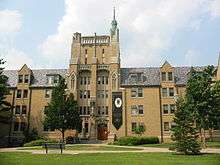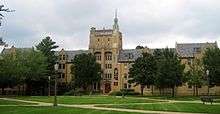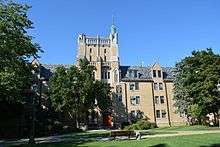Morrissey Hall (University of Notre Dame)
Morrissey Hall, also known as Morrissey Manor, is one of the 31 Residence Halls on the campus of the University of Notre Dame and one of the 16 male dorms. Built in 1925, its architects were Vincent Fagan and Francis Kervick.[2] Along with other buildings on Notre Dame's campus, it is on the National Register of Historic Places.[3][4]
| Morrissey Hall | |
|---|---|
 Blazon: Sable a saltire Or | |
| Campus quad | South |
| Motto | Bonum Jucundumque Habitare Fratres |
| Established | 1925 |
| Colors | Black and Gold |
| Gender | Male |
| Rector | Zachary Imfeld |
| Undergraduates | 200 |
| Postgraduates | 2 (serving as Assistant Rectors) |
| Chapel | Little Flower |
| Mascot | Manorites |
| Interhall sports | Badminton, Baseball, Basketball, Bowling, Cross Country, Dodgeball, Football, Golf, Hockey, Lacrosse, Racquetball, Soccer, Table Tennis, Tennis, Volleyball |
| Charities | Catholic Worker House |
| Major events | Manor Madness Week, Medallion Hunt, Mattress Race, Christmas Formal |
| Website | http://morrissey.nd.edu |
Morrissey Hall | |
 | |
| Location | Notre Dame, Indiana |
| Coordinates | 41°42′03″N 86°14′33″W |
| Built | 1925 [1] |
| Architect | Francis Kervick & Vincent Fagan |
| Architectural style | Collegiate Gothic |
| Part of | University of Notre Dame: Main and North Quadrangles (ID78000053) |
| Added to NRHP | May 23, 1978 |
History

Howard Hall was completed in 1925 as the first of three new freshman dorms built by president Walsh; Morrissey and Lyons Halls were to be the next two.[5] The construction of these dorms was a response to the high number of Notre Dame's collegiate students living off campus and the rapid increase in student population after World War I. The building of both dorms was assigned to the architecture firm of Kervick and Fagan. Francis W. Kervick (1883-1962) and Vincent F. Fagan (1898-1951) were also professors at the Notre Dame department of architecture. They designed many of the school's new buildings during the 1920s. The University chose Smoger & Company to build Morrissey Hall for $275,000, and Christman Brothers to construct Lyons for $200,000.
Morrissey boasts some of the most elaborate architecture of any dorm on campus. With its elaborate masonry and tall tower, Morrissey's exterior is most impressive. It became the center of the 'Gold Coast', the complex formed by Morrissey, Lyons and Howard, and the masterpiece of Kervick and Fagan.[6] The elaborate stonework, reminiscent of Gothic cathedrals, and the well furnished entrance hall with the look of a gentleman's club with fine wood paneling and a fireplace made Morrissey one of the most elegant and fashionable constructions on campus at the time.[7] Francis and Kervick incorporated asymmetrical details including an off-center front door, a one-sided spire and mismatched roof-lines. A statue of Morrissey's patron saint, the apostle Andrew, stands to the left of the dorm's entrance, a work of Hungarian sculptor Eugene Kormendi, who was sculptor in residence at Notre Dame.[8][9]

The construction of both the dorms began in 1925 on land that was previously used as the University's farm land on the west side of the future South Quad. Morrissey was completed by the fall of 1926 [10] and most of Lyons Hall was completed in time for fall classes in 1926.[11] The smaller east annex was completed in the fall of 1927.[12] Morrissey Hall underwent a 2-year, multimillion-dollar renovation during the summers of 1997 and 1998. A complete overhaul of the exterior gave the hall new landscaping, sidewalks, a new roof, gutters, and more bike racks, while the interior renovation gave us remodeled rooms for the students (with new doors, furniture, sinks, floors, and internet hook-ups for each student), new and improved common social spaces, study areas, laundry facilities in the basement, and lounges on each floor equipped with cable television.
The interior of the building was extensively renovated during the entirety of the 2018-2019 school year, during which, the residents of Morrissey were temporarily relocated to nearby Pangborn Hall. With this upgrade came a remodel of most of the rooms both common rooms and bedrooms expanding them and adding better furniture. The new and current hall has a variety of modern recreational features, such as custom foosball and air hockey tables and a Nintendo switch in each of five lounges in the building. Some of the other upgrades include two full kitchens, two kitchenettes, and a back patio that overlooks the lake and Morrissey's beach volleyball court. [13][14]
Insignia and traditions
Morrissey Hall is named after Fr. Andrew Morrissey, C.S.C., Notre Dame's seventh president.[15][16] The dorm's motto, "Bonum Jucundumque Habitare Fratres" means, "It is good and pleasant for brothers to live together." is taken from Psalm 133. The symbol of the hall is the Saltire, or St. Andrew's Cross, which represents St. Andrew, Fr. Morrissey's patron saint. Its coat of arms is the Cross of St. Andrews, yellow on black (the colors of the hall).

Morrissey was one of the first dorms to have its own fight song, “Fight on for Morrissey”. It was written by Bill Murphy ‘74 in an attempt to rally the hall's football team over arch-rival Dillon. In 1970, the hall lost the Inter-Hall Football Championship to Dillon during a final game which tied awarded to Dillon based on amassing more first downs. In 1971, the hall lost again the title game to Dillon on a snow-covered Moose Krause Field in a tiebreaker format. In 1972, the third consecutive final against Dillon, the hall staged a pep rally in order to rally for the win and a fight song was created.
Two main aspects of dorm social life in Morrissey are the basement night-time restaurant, Yaz's, and weekly section competitions. Yaz's was founded in the early 1990s and in the late 2010s saw a resurgence by featuring Pork Mac n Cheese and wide assortment of homemade shakes.[17] The second key part of weekly community in the dorm, section competitions, is the newest of Morrissey's traditions. Founded in the fall of 2018 when Morrissey residents were temporarily in Pangborn hall during the dorm's renovations, every Sunday night the seven sections of Morrissey compete in some sort of a competitive event to compete for the Manor cup and a permanent plaque hung in the basement of Morrissey. Some of the most popular examples of these are a 3v3 basketball tournament, a hot wing eating contest, and a mariokart tournament.
Every year, Morrissey hosts a Christmas Formal in which historically Santa Claus would personally deliver invitations and candy canes to all of the ladies who were asked to the dance although this part of the tradition has not occurred since the early 2010s. The day-long festivities of the modern dance, which include decorating the entire walls of the dorm in wrapping paper and a massive barbecue, take place on the Saturday before the final week of classes each Fall and culminate in a dance that is attended by nearly every resident. Although presently a significantly smaller tradition, historically one of the major traditions of the dorm is the Manor Medallion Hunt. Each spring, the Manor Medallion Hunt sweeps the Notre Dame campus by storm. During a week long campus-wide search for a single three-inch medallion, daily riddles are printed in the Observer to help direct treasure hunters to the medallion. The lucky one who finds the medallion wins a prize of $250. An older discontinued Morrissey tradition is the Gilded Age Ball, when Morrissey residents step back in time and relive the days of the Gilded Age with a dance based on the music and attire of the 1920s.
Sports and awards
Morrissey has won Hall of the Year for 2006-2007. It also has been inter-hall Football champion in 2006, 2014, and 2015, with a runner up in 2019. It won inter-hall Baseball in 2006, 2007, 2008, and 2009, inter-hall Basketball in 2008-2009, inter-hall Ultimate Frisbee in 2008 and 2009, and inter-hall Hockey in 2013, 2015, and 2016. Morrissey is nearly always a dorm that compete's for the title of best athletic dorm (the O'Leary Cup) mainly based on its consistency in placing on the podium for a variety of smaller sports, such back to back top three finishes for Raquetball, Dodgeball, Flag football, and Sand Volleyball from 2018-2019. [18]
Notable residents
Other sources
References
- "Official Building Inventory" (PDF). Facilities Design and Operations. University of Notre Dame. 1 October 2015. Archived from the original (PDF) on 4 March 2016. Retrieved 11 November 2015.
- https://secure.in.gov/apps/dnr/shaard/r/1c9d1/N/University_of_Notre_Dame_Campus_Main_and_South_Quadrangles_St._Joseph_CO_Nom.pdf
- https://secure.in.gov/apps/dnr/shaard/structural_surveys.html?_flowExecutionKey=_c8211B3C1-5A12-5149-C806-D81F4036E65B_k57E94178-9E4C-CCAD-FBDF-5D309D3D8FAE
- James T. Burtchaell (November 1976). "National Register of Historic Places Inventory/Nomination: University of Notre Dame Campus-Main and South Quadrangles" (PDF). Indiana State Historic Architectural and Archaeological Research Database and National Park Service. Retrieved October 18, 2017. With seven photos from 1972-76. Map of district included with text version available at National Park Service.
- Tucker, Todd (2018). Notre Dame vs. the Klan: : how the fighting Irish defeated the Ku Klux Klan. University of Notre Dame Pess. ISBN 9780268104368.
|access-date=requires|url=(help) - http://www.archives.nd.edu/Scholastic/VOL_0059/VOL_0059_ISSUE_0012.pdf
- http://www.irishlegends.com/pages/postcard/postcard_oct01.htm
- Notre Dame Archives (17 June 2011). "Campus Statue Project". Notre Dame Archives News & Notes. Retrieved 5 November 2019.
- "Eugene Kormendi". Smithsonian American Art Museum. Retrieved 5 November 2019.
- http://morrissey.nd.edu/history/
- http://www.archives.nd.edu/Alumnus/VOL_0005/VOL_0005_ISSUE_0001.pdf
- http://www.archives.nd.edu/Alumnus/VOL_0006/VOL_0006_ISSUE_0003.pdf
- "Morrissey residents relocate to Pangborn Hall for renovations". The Observer. 22 August 2018. Retrieved 6 November 2019.
- "Morrissey Hall Selective Renovations". Facilities Design and Operations. University of Notre Dame. Retrieved 6 November 2019.
- Tucker, Todd (2018). Notre Dame vs. the Klan: : how the fighting Irish defeated the Ku Klux Klan. University of Notre Dame Pess. ISBN 9780268104368.
|access-date=requires|url=(help) - http://morrissey.nd.edu/history/fr-andrew-morrissey-csc/
- "Yaz's: Best dorm food on campus // The Observer". The Observer. 5 December 2018. Retrieved 11 July 2020.
- http://morrissey.nd.edu/freshmen/manor-facts/
- Ed Cohen (Spring 2003). "Hall Portrait: Morrissey Manor". Notre Dame Magazine. University of Notre Dame. Retrieved 2019-11-08.
